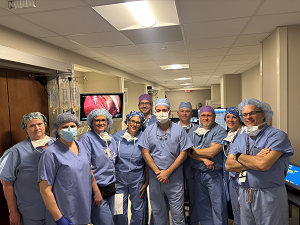NRP Skills Session - Genesys
The Neonatal Resuscitation Program®️ (NRP®️) course conveys an evidence-based approach to care of the newborn at birth and facilitates...
At Henry Ford, our mission is help you achieve the look you want and gain personal confidence and satisfaction in yourself through both surgical and nonsurgical facial rejuvenation.
Our team of experienced, board-certified surgeons have performed hundreds of procedures on patients of all backgrounds and ethnicities, have won numerous awards for their work and are nationally recognized.
Facial plastic surgery can help you fix aspects of your face you feel detract from your appearance. We can also combat the effects of aging. Our experts will work with you to restore your youthful appearance with the following surgical options:
We offer many forms of non-surgical facial skin rejuvenation, including:
Our cleft and craniofacial services provide specialized care for patients with keloids, cleft lip, cleft palate or defects of the head, skull and face.
The Neonatal Resuscitation Program®️ (NRP®️) course conveys an evidence-based approach to care of the newborn at birth and facilitates...
Unleash your creativity and embark on a transformative journey with Art in Bloom, Henry Ford Cancer's latest art therapy offering at Henry Ford...
While the use of meditation and breathing exercises are not an alternative treatment or cure for cancer, they have been shown to help people with...
The Neonatal Resuscitation Program®️ (NRP®️) course conveys an evidence-based approach to care of the newborn at birth and facilitates...




Nearly 3 in 4 U.S. adults are now overweight or have obesity. Find out what’s driving the trend, and what can be done to reverse it.

If you're one of the millions of Americans affected by clinical depression, your primary care doctor can be a valuable resource for helping to manage it.

An overwhelming amount of people who are diagnosed with pancreatic cancer test positive for a specific gene (called KRAS) that promotes cancer development. Because of this, a huge number of treatments are being researched to target the KRAS gene.

Changes in air pressure can lead to clogging, pressure and popping in your ears. Learn why this happens—and when it might be a cause for concern.
We use cookies to improve your website experience. By using this site, you agree to our Terms of Use. Read our Internet Privacy Statement to learn what information we collect and how we use it.